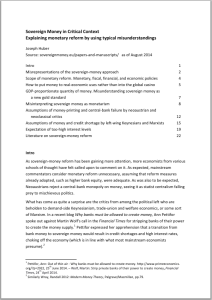Explaining monetary reform by using typical misunderstandings

As sovereign-money reform has been gaining more attention, more economists from various schools of thought have felt called upon to comment on it. Apparently not all commentators are taking the time to get to know what it is all about, with the result that the circulated information often contains a number of typical misrepresentations, reads the new paper by Prof Joseph Huber entitled “Sovereign Money in Critical Context”.
The paper deals with criticism of monetary reform as put forth in the recent past by mainstream commentators, Neoaustrians, demand-side Keynesians, and others. It analyses and explains the various misrepresentations of the sovereign-money approach:

identifying, and thus confusing, the 100%-reserve approaches of the 1930s with the present-day concept of sovereign-money reform
over-interpreting the meaning of ‘putting an end to bank money’ as curtailing important banking functions such as making loans, or account management and payment services
maintaining that account management and payment services will be taken from the banks to be integrated into the central bank
assuming that sovereign money is about nationalization of banking
misunderstanding sovereign money as a new gold standard
misinterpreting sovereign money as monetarism
assumptions of “money-printing and central-bank failure” and accusations of introducing bureaucratic centralism by neoaustrian and neoclassical critics
assumptions of money and credit shortage by left-wing Keynesians and Marxists
expectation of too-high interest levels
The left-wing defenders of the banking industry’s monetary privileges criticize a fictitious tight-money high-interest regime benefitting the rich, while at the same time ignoring how the present loose-money, low-interest, high-debt regime directly feeds the GDP-disproportionate accumulation of financial assets, resulting in a distributional bias that actually benefits capital revenue at the expense of earned income.
The paper also talks about the scope of monetary reform, monetary, fiscal, financial, and economic policies.
In a sovereign-money system, banks can be free service providers, money lenders and investors, but they must no longer create themselves the money on which they operate, because this is an economically dysfunctional neo-feudal privilege.
And it answers an often raised critical question concerns how to ensure that sovereign money is channelled into useful financial investment, geared towards real-economic rather than casino-style purposes.
Managing the money supply in correspondence with the economy’s real growth potential can only be achieved if money creation is separated from banking, and if the creation of bank money, which is basically unlimited, is put to an end, thus enabling the central bank to pursue effectual monetary quantity policies.
There are certainly good reasons to be realistic about central bankers and other humans under stress and strain. History is full of mischief under various political regimes and institutional arrangements. Take, however, the judiciary as an example of what separate-power independence realistically entails. There are wrongful convictions, and judges are basically no less influenced by the spirit of the time than other contemporaries. Nevertheless, most court judgements appear to be fairly reasonable applications of the law. Some may be criticised, but are observed, and all in all the system works well enough.
Seeing public banks, or business models of green-ethical banking, as an alternative to monetary reform, makes for an unnecessary and unwise political divide and is a distraction from what is of utmost importance at this point in the history of money and banking, i.e. a transition from bank money to sovereign money, or to put it more precisely, the second regaining of monetary sovereignty by replacing bank money on account with central-bank money on account.
Read Sovereign Money in Critical Context